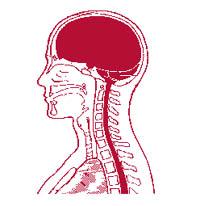Snore: a thousand headaches
1999/11/21 Kortabarria Olabarria, Beñardo - Elhuyar Zientzia

According to studies conducted for the study of sleep, 25% of adults are frequent snoring. Adult, man and something thick, this would be the portrait of the hoarseness.
Snoring occurs when there is an obstacle to the air in the upper respiratory tract. The upper part of the pharynx, where the tongue, the upper part of the throat, the bustle of the mouth and the palate converge, is easily lockable. Snoring occurs when some of the parts mentioned when breathing come together and vibrate.
The confluence of these parts of the airway and the appearance of vibrations can be diverse. On the one hand, the muscles in the throat and tongue may be relatively weak. In these cases, when the muscles relax too much, the tongue falls back, towards the pharynx, preventing air from passing properly. Alcohol abuse, drug use, or just too deep sleep can lead to excessive muscle relaxation.
Soft throat tissues, such as tonsils and adenoids, can also be snoring agents. The presence of a soft palate and a large mouth lobe can also reinforce stiffness. In these cases, both the palate and the shore move to the throat and narrows the passage of the pharynx. In addition, during the respiratory process, the palate and the oral waist are hung and act as exciting valves.
Finally, common causes of snoring include nasal problems. When the nose is closed it is necessary to make a great respiratory effort, which causes a greater vacuum effect in the pharynx and facilitates the mobilization of the surrounding tissues.
Regardless of the reasons for Zurrung, you have to take the issue responsibly. It can be a more serious problem than you think for coexistence; for example, in the media you could read more than once the news about couples separated by rigors. From a health point of view, it is important to snore. According to health experts, snoring breaks the pace of sleep, preventing them from resting properly. When snoring is excessive, it can cause serious health damage. One of the best known is sleep apnea.
Apnea, ear but unknown

Breathing interruptions are called apnea during sleep, especially when they are greater than 10 seconds. Apnea is called obstructive when a throat or nose problem prevents air from passing through the respiratory process. Children with obstructive apnea stop breathing occasionally; however, the lungs continue to work to release the person who stops breathing.
When obstructive apnea is large, the blood carries little oxygen, which can cause heart problems and slow growth and development in children. Soft obstructive apneas also cause problems, but they are not as important as feeling tired and daytime sleep.
To cope with respiratory interruptions in sleep, first you need to find the causes and then start proper treatment. The usual treatments are:
- For children ages 3 to 7, most of the time they are problems with tonsils and adenoids. Once the diagnosis is made, the appropriate decision will be made.
- Obesity can also cause obstructive apnea. Remedy? Removal of kilos, always under medical control.
- If the problem is nasal it is resolved with treatment or surgery.
- Devices that are placed on the face and help breathe better while you sleep.
These are the usual treatments, but, as in all health issues, experts should decide what to do in each case. In the case of snoring and apnea, the otorhinis have the word, they themselves will have to decide if the problem is limited to noisy snoring or even apnea exists. For this, experts analyze the mouth, nose, throat, palate, etc. of snoring. If this study is not enough to find the problem, they can make a sleep control and therefore decide the effect that rigors or apneas have on health.
The treatment of snoring always depends on the diagnosis made and the appropriate measures should be taken by the doctors. However, there are lifestyle habits that can help reduce snoring:
- Do sport to lose some weight and harness muscle efficiency.
- Avoid sedation, as they produce deep sleep.
- Avoid alcohol and heavy binge drinking before bedtime.
- Respect sleep hours.
- Avoid sleeping up, as in that position the snoring is older.
- Lift the headboard to prevent parts close to the airway from going to the throat area.
Compared to others, although the snoring problem seems unimportant, it causes many headaches to those who have it and to those who support it. Imagine that in Spain there is also a snoring association, created with the aim of helping and informing those who snore. They also have their website on the internet at the following address: http://personal.redestb.es/eros/suenyo.htm.
Sleep well and quiet!
Published in 7

Gai honi buruzko eduki gehiago
Elhuyarrek garatutako teknologia






